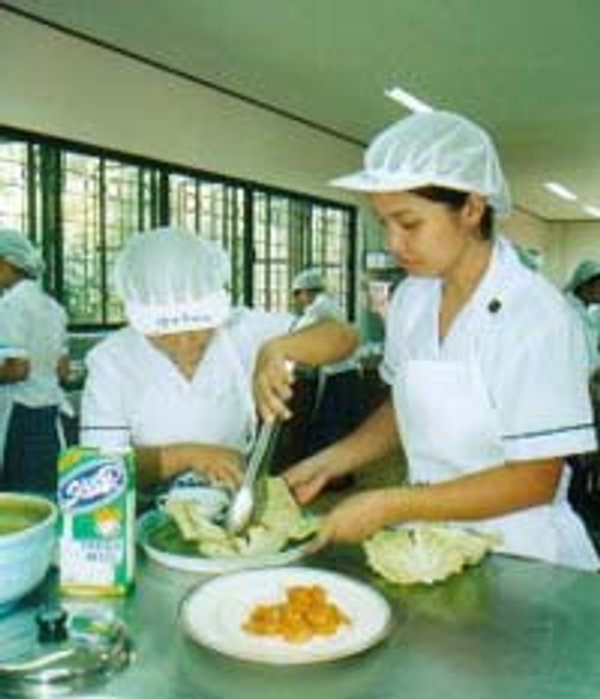Tucked among the hills of historic Calamba City, Laguna, Philippines, a school is trying to make a difference in the lives of young women by teaching them how to bake with love.
That’s one of the “secret ingredients” of the school’s chewy chocolate brownies, its most popular product. “Our students are taught not only the proper way to cook and bake,” says Rowena Nazareno, Director of Anihan Technical School. “More than anything, we teach them how to cook with love.” Such virtues as order, cleanliness, teamwork, and cheerful service are folded into the pastries along with the other ingredients.
Anihan Technical School is a project of the Foundation for Professional Training, Inc. (FPTI). It offers a two-year diploma course in food service, with a specialty in baking. Along with culinary skills, students learn the principles of good business practice and entrepreneurship.
The teachings of St. Josemaría Escrivá, founder of Opus Dei, about work and study inspire FPTI’s projects for the advancement of women.
“All work,” he wrote, “contributes to human dignity and dominion over creation. It develops personality, brings us closer to others, supports the family, promotes improvements in our own society, and contributes to universal human progress.”
FPTI seeks to raise the educational level of women by developing their skills, for the benefit of their families and society at large.
Cakes and Values
Doreen Grace Guevarra, 18, a second year student of Food Service, likes to read cookbooks and dream about making what she sees in them. Now she can bake chocolate and chiffon cakes that look just as attractive as the ones in the cookbooks.

“I like baking,” she says, “but here, they teach us not only to bake good cakes, but also to become better persons. My family has noticed a change in me. I used to be very impatient with my younger brothers and sisters. But I’ve learned to speak with more refinement and to be more aware of the consequences of my actions. I realize that if I didn’t change, my quick temper would drive away my family and friends.”
What Rochelle Bertudes, 17, likes most of all about Anihan is its outreach project in one of the nearby neighborhoods. This second year student teaches the children catechism, math, and personal hygiene.
Rochelle is eager “to help take care of these children because most of them don’t seem to get enough care. They have runny noses, and nobody at home tells them they’re wearing their clothes inside out. Besides being unkempt, they don’t even know their birthdays.”

Anihan has also taught Rochelle how to pray. She says her parents are so busy earning a living they don’t have time for such instruction.
Her father is a cab driver, and her mother sells vegetables in the public market. This takes her out of their home between 5 a.m. and 8 p.m. every day of the week, including Sundays.
Rochelle encourages her mother to come with her to Sunday Mass before she goes to work. “Sometimes she comes.”
“I’ve learned to pray while working. As I clean a plate, for example, I can pray a Hail Mary. Often I pray for my parents that they not get too tired at work. It’s easier to cope with difficult schoolwork when I offer it for my parents,” Rochelle adds.
Harvest for a Better Future
This year all 120 students at the school are on scholarship. They pay only the miscellaneous fees. Students come from the nearby provinces of Laguna, Batangas, Cavite and Quezon.
Anihan’s operating funds come from the sale of baked products and preserved foodstuff, private donations, and government aid. At present, 45 per cent of the total income derives from the sale its products.
Eventually, Anihan aims to become completely self-supporting by increasing sales from last year’s 3 million pesos to 5 million.
According to the director, Rowena Nazareno, the goal “is to provide young women from low-income families with skills that not only develop them personally but enable them to earn a living. Our graduates work in bakeshops, hotels, restaurants, and other food services. Some go on to become entrepreneurs.”
Julie Ann Balneg, 18, a second year Food Service student, hopes to own a small restaurant someday to help her family. Already her summer job enabled her to buy a school bag and new clothing for her younger sister. Other students work part time at the Livelihood Training Center to earn money for food and transportation.
Rochelle Bertudes plans to work at a fast food store after graduation. “When I’ve saved enough money, I want to pursue further studies in food service. Someday, I want to own my own bakery.”
She especially appreciates how Anihan “takes a genuine interest in our welfare. They try to know us and sincerely want us to learn.”
Doreen Guevarra also cites the attention the school gives to each student: “This is a good school. It’s rare that one finds a school that seeks to develop the entire person. It would be a waste if I took this opportunity for granted.”
“Anihan” means harvest time in Filipino. The school offers the young women who study there a rich harvest of possibilities for a better future for themselves and their families.
